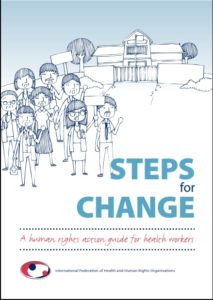 This step-by-step method for framing a particular problem as a health and human rights issue is based on the IFHHRO booklet Steps for Change. A human rights action guide for health workers (2012). This guide, which can be downloaded in PDF format from our website, is available in English, Spanish, Portuguese, French, Russian and Georgian.
This step-by-step method for framing a particular problem as a health and human rights issue is based on the IFHHRO booklet Steps for Change. A human rights action guide for health workers (2012). This guide, which can be downloaded in PDF format from our website, is available in English, Spanish, Portuguese, French, Russian and Georgian.
Steps for Change is a guide for health workers who want to use human rights to improve their healthcare system. The guide was created in response to a question that often arises when we provide training to health workers on the interrelation between health and human rights:
How can I use human rights to address problems in my own workplace?
What can you do?
Of course the answer to this question is different for every health worker. What exactly you can do as an individual health workers depends on multiple factors including your abilities, connections and position, the context or situation you are in, and the human rights issue concerned.
At the same time you and other health workers, have a unique position because you are the ones who directly experience and see the effects of those aspects of a healthcare system that do not conform with human rights. Due to the nature of their profession health workers inevitably play a role in the protection and realisation of health related human rights.
Human rights as a useful tool
Through our training courses we have helped health workers understand how their profession is connected to human rights; to be able to recognise human rights issues within the healthcare system and know that human rights can help health workers in difficult situations.
This guide goes a step further by approaching human rights as a useful tool; to stop unjust practices, to get people to listen, to mobilise support and to find out what should change.
|
“When I was first called upon to examine survivors of ruthless beatings and maiming by state security forces, it turned out to be a loud call. Caring for these torture survivors changed from relieving pain and managing their injuries to intervening in gross violations and abuses. My understanding of my role as a clinician changed then. I could have chosen to be a silent clinician or to use my skills to document and stand up against these violations. Every day, I continue to choose the latter.” Dr Joan Nyanyuki, Kenya |
|
“I have noticed that human rights are a powerful tool for realizing the right to health. Being health workers, we are dealing with a huge work load and have limited time for a comprehensive understanding of theories and application of human rights mechanisms. I think one of the main problems is that many doctors have not heard anything about human rights and the right to health during their medical school or residency years. We must emphasize the need for medical school curricula to include human rights.” Dr Nazmi Zengin, Turkey |
Contents
The guide consists of two main sections, a list of additional resources and a glossary. See here for an overview of the chapters.
Section 1 provides basic information on the interrelation between healthcare and human rights. This section is not meant to be exhaustive, but serves to support Section 2. Relevant terms that may require further explanation are included in the glossary.
Section 2 contains a set of practical steps on how to frame healthcare problems as human rights issues and find out what steps to take for change. These steps need to be applied to a specific problem identified within a healthcare system. The steps work sequentially; the outcome of the previous step serving as input for the next step. Templates for each step can be found here.
It is possible to start with the five Steps for Change in Section 2 and use Section 1 as a reference only where necessary.
|
“As a mental health worker I have been involved with people with mental disorders and disabilities, with war affected and internally displaced people, with torture survivors, prisoners, etc. In all these areas human dignity is generally abused. Mental health is a field that is full of human misery and ill-treatment, stigma and exclusion. When I found the concept of human rights and started to learn about this mechanism I realized that I had obtained a strong foothold, a structure, an instrument for fighting with an inefficient system and reforming practices. Human rights have given us a backbone which has become very important in our everyday work with: • our beneficiaries; to promote respect, confidentiality, inclusion • the media; to promote rights and non-discriminatory wording • state officials; to advocate for the best possible healthcare delivery or recommend appropriate standards and protocols of care • society; to raise awareness on tolerance, stigma, rights to effective, affordable and available treatment, etc. etc.” Dr Nino Makhashvili, Georgia |
> Go to Section 1 – Human rights for health workers > Go to Contents
